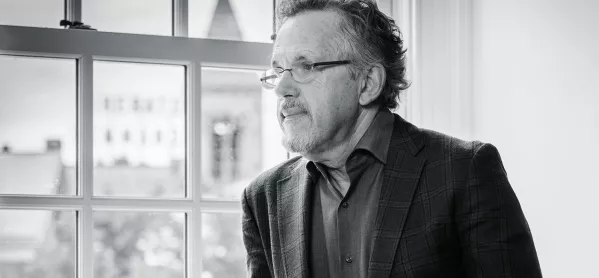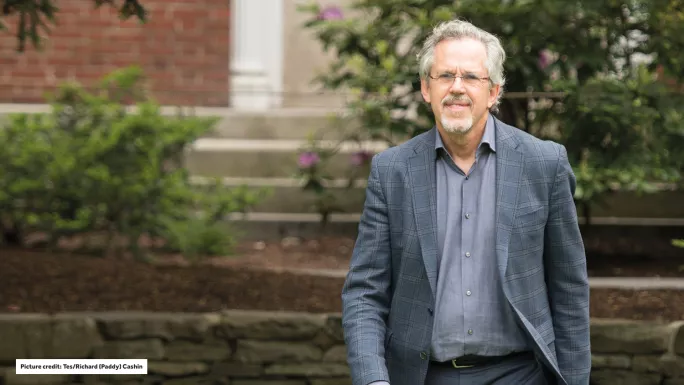- Home
- TES talks to... Paul Reville
TES talks to... Paul Reville

Professor Paul Reville knows that the education system, in its current state, does not work.
The Francis Keppel professor of practice of educational policy and administration at the Harvard Graduate School of Education says: “What we’re doing in schools, were we doing it in medical care, would be like opening a hospital and saying to everybody who arrived at the door, ‘Irrespective of your ailment, we’re going to give you the same treatment, the same length of stay’, and hoping that, in general, this served the public health.
“It wouldn’t work in healthcare and it isn’t working in education either.”
As the founder of Harvard’s Education Redesign Lab, he obviously has a wealth of ideas to fix this problem. The lab conducts research and trials new policies within a number of schools and communities, anticipating that these will ultimately inform the policy changes it would advocate at a national level.
But, for the most part, he thinks that many within the system - and the social and tech entrepreneurs with an education interest outside it - are doing pretty well at forcing change in the right direction.
A number of schools are attempting to find a process that works for all children, he explains, through student-centred, customised learning that involves “meeting children where they are and tailoring our curriculum, instruction and assessment to advance that child”.
So Reville is looking at the problem from a slightly different angle - and his research is something that politicians need to pay attention to if they are serious about creating an education system that really does work for everyone.
“Statistics tell us the best predictor of a student’s academic achievement or attainment is the socioeconomic status of their family at birth,” explains the former classroom teacher and principal of two high schools. “The reality is, on average, demographics are destiny.”
Poverty matters
As a result, what Reville is most concerned with currently is what goes on outside schools that feeds into children’s education - something that he feels is currently not given enough attention.
“We’ve been embarked, in the US, for the past two-and-a-half decades, on a set of reforms designed to optimise the way in which schools operate,” says Reville.
“The theory is, if you have a good school and you put everybody through that good school, you will have created the conditions of a meritocracy - every child, irrespective of their background, will have access to what they need to be successful in our society. That is manifestly proved not to be true. The statistics tell us poverty still matters.”
Reville says we need to have a holistic view of education that encompasses more than what happens in the school building. One issue, he notes, is that by the time kids even start formal schooling, their background will have affected them.
“We have kindergarteners coming into school in this country who come from a welfare family and…by virtue of their prior experience, they separate into quintiles,” he notes. “If you follow them through the 13 years of K12 schooling [from kindergarten to 12th grade - the final stage of secondary school], there is very little movement between those.
“School consumes roughly 20 per cent of a child’s waking hours between kindergarten and grade 12 in the US. If you’re affluent, you have access to continuous different kinds of learning opportunities outside school, from the technology in your home to tutoring, to summer camps, to recreational activities and sports. If you’re poor, you don’t, so there’s rampant inequality.
“If we expect to have education that brings everybody to roughly the same place, we’re going to have to equalise access to those kinds of opportunities.”
A holistic approach
The other major change Reville wants to see is better integration of health services, social services and schools - something that prime minister Theresa May has hinted at.
“We need to take a holistic approach to eliminating those barriers in the way of children coming to school and being attentive when they get there,” he explains. “So their health, mental health, social support, housing stability, sense of safety, being well nourished are all important to schools, but schools can’t solve these problems by themselves.
“For example, if you’re a teacher and you know a child is homeless, you know she isn’t going to be able to learn, as long as she’s suffering from the traumatic stress of that situation. You need to be part of a system where you can pick up a telephone and be connected with someone in the community - presumably a housing agency - that can actually do something about it. We need more ‘connective tissue’ between our schools and our family serving organisations, so we don’t operate so much in silos anymore.”
What does that mean in practical terms?
“It needn’t be overly complicated or innovative,” he explains. “I want to see mental health clinics make their counsellors available after school hours on school sites. I want dental, hearing and optical screening in school. I want to see a health and human services coordinator in every school with high concentrations of low-income children.”
He gives an example of this in action: “A while ago, a new principal went into one of the lowest-performing schools in San Diego - where the average local income was $14,000 (£10,877) a year per family - and she brought in a health clinic serving the students in the school and five surrounding schools and their siblings. That was part of an overall scheme that propelled that school from the bottom of the achievement pile to at, or near, the top.”

Reville believes this approach will serve not only students but teachers, too, as pressure will be taken off schools if children’s education is perceived as a community responsibility. “A lot of people think it’s too ambiguous, too blue sky, too ambitious, too complicated to be doable, and I think that’s a cheap excuse,” he says.
The main question, of course, is where’s the money going to come from?
He believes to some extent it’s not about funding new services, but just better connecting and coordinating pre-existing ones, using schools as the “curators”. Also, he notes, some funding may already be there for the taking. In the San Diego school, for example, he says the head was able to cover about 95 per cent of the cost of the clinic with funding from Medicaid (a US means-tested health and medical services programme).
Still, he recognises that money will be needed for funding after-school activities, for example, but says that the cash will be found if the argument as to why this is necessary is won.
“We do have a political challenge in front of us to persuade society of the economic arguments behind this,” he admits. “Our current system is an industrial factory model, adopted in the early 20th century, when we needed mass-produced education for an economy that was low-skill, low-knowledge. But we’re in a very different time now where the jobs available that enable people to support themselves and a family are high-skill, high-knowledge. So we now need to educate everybody to a level previously reserved for an elite few. Either we do this or we don’t grow our economy, and we develop a growing underclass of people who become an active drag on it.
“Closing achievement gaps is not only a moral obligation, but is what’s economically in our self-interest to do.”
Developing the proof
So what can teachers compelled by Reville’s philosophy do? At this stage, it’s about joining the conversation. “I’d encourage teachers to use their organised voice through labour unions and their individual voice in their own contexts in schools, to discuss what it will take for them to be able to educate all children to a high level,” he suggests. “They can help to forcefully advance the agenda, saying loudly and clearly, ‘Poverty matters.’”
Reville is striving to give them the evidence to present to the powers that be. Currently, Education Redesign Lab is working with several US cities to trial its concepts.
Within these cities, Children’s Cabinets have been formed, led by the mayor, bringing together superintendents [managers in charge of a number of schools or a school district]; heads of health and social services; recreation, cultural and arts ‘activists’; and other key community leaders. Their mission is to brainstorm ideas, come up with strategies and implement them to uncover which are the most effective (bit.ly/HarvardByAllMeans).
“When people say, ‘OK, I buy the argument, Paul, what should I do on Monday morning?’ I want to be able to present them with the building blocks,” says Reville. “My hope is that in the next three to five years, we have proof points from these cities. This will also build much greater public support for thinking of our children and society as just that - ‘our’ children, not somebody else’s.
“We need urgently to do for all children what those of us with privilege would do for our own.”
Jessica Powell is a freelance journalist. For more on the Education Redesign Lab’s work, visit edredesign.org
Keep reading for just £1 per month
You've reached your limit of free articles this month. Subscribe for £1 per month for three months and get:
- Unlimited access to all Tes magazine content
- Exclusive subscriber-only stories
- Award-winning email newsletters



